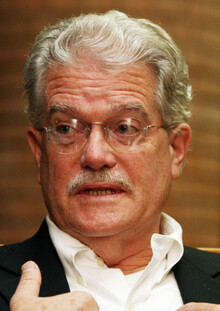hankyoreh
Links to other country sites 다른 나라 사이트 링크
Bruce Cumings says sanctions have failed, time for dialogue with North Korea

By Park Hyun, Washington correspondent
During a Dec. 15 interview with the Hankyoreh, University of Chicago history professor and authority on modern Korean history Bruce Cumings voiced his thoughts on North Korea’s recent long-range rocket launch. Calling the launch proof of the ineffectiveness of the Barack Obama administration’s “strategic patience” approach, Cumings, 69, said Washington would be better served to favor active dialogue over ineffective sanctions.
Hankyoreh What are your thoughts on North Korea’s long-range rocket launch?
Bruce Cumings I think the success of the missile launch shows the inadequacy of the Obama administration’s “strategic patience” approach. Since Obama took office, North Korea has conducted a successful plutonium-based nuclear test and launched three long-range missiles. The third one finally succeeded in putting a satellite in orbit. The whole idea of “strategic patience” is based on Secretary of State Hillary Clinton’s assumption that there’s a power struggle going on in North Korea, and that the regime is destined to crumble. It’s now become clear that this is no strategy at all. There were no problems in the process of power being transferred from Kim Jong-il to Kim Jong-un. By just continuing to wait and wait, the US has allowed North Korea to get that much closer to being a nuclear state with strong missile capabilities.
Hani Seoul and Washington are pushing for stronger sanctions on North Korea. Is this the right response?
Cumings North Korea is already the most sanctioned regime in world history and since the 1950s, those sanctions have failed to change its behavior. The only progress we‘ve seen in dialogue with North Korea since the Korean War came in 1994. That was when Bill Clinton decided to negotiate with Pyongyang, and the Yongbyon nuclear facilities were frozen for eight years. Between 1998 and 2008, Kim Dae-jung and Roh Moo-hyun negotiated on a lot of important issues with North Korea. And in 1998 to 2000, the Perry process [named after Clinton-era US secretary of defense William Perry] led to effective negotiations. We need to note that there is a record of success in dialogue with North Korea, which is different from the case of Iran.
Hani Could you compare the different South Korean presidential candidates’ platforms on North Korea?
Cumings I’m convinced Moon Jae-in [the Democratic United Party candidate] will work very seriously to restore dialogue with North Korea. I expect his policies to be similar to Roh Moo-hyun’s. In particular, I think he’ll bring back the important agreements that were reached in the second round of inter-Korean summit talks. Park Geun-hye [the Saenuri Party candidate] may want to have dialogue with North Korea just because the results of Lee Myung-bak’s hard-line policy were so poor. But her conservative supporters may not let her.
Hani How do you expect relations between Washington and Beijing to unfold in the Xi Jinping era?
Cumings China is still very weak militarily. It’s going to take several decades before it can compete with the US in terms of global power. Furthermore, the US has an alliance of large enterprises across party lines pressuring it to maintain an economic relationship with China and avoid any crisis between them. There may be some tough times ahead like there were in the past, but I see the overall trend as being toward a harmonious relationship between the US and China. And that will benefit both North and South Korea.
Please direct questions or comments to [english@hani.co.kr]

Editorial・opinion
![[Column] Season 2 of special prosecutor probe may be coming to Korea soon [Column] Season 2 of special prosecutor probe may be coming to Korea soon](https://flexible.img.hani.co.kr/flexible/normal/500/300/imgdb/original/2024/0426/3317141030699447.jpg) [Column] Season 2 of special prosecutor probe may be coming to Korea soon
[Column] Season 2 of special prosecutor probe may be coming to Korea soon![[Column] Park Geun-hye déjà vu in Yoon Suk-yeol [Column] Park Geun-hye déjà vu in Yoon Suk-yeol](https://flexible.img.hani.co.kr/flexible/normal/500/300/imgdb/original/2024/0424/651713945113788.jpg) [Column] Park Geun-hye déjà vu in Yoon Suk-yeol
[Column] Park Geun-hye déjà vu in Yoon Suk-yeol- [Editorial] New weight of N. Korea’s nuclear threats makes dialogue all the more urgent
- [Guest essay] The real reason Korea’s new right wants to dub Rhee a founding father
- [Column] ‘Choson’: Is it time we start referring to N. Korea in its own terms?
- [Editorial] Japan’s rewriting of history with Korea has gone too far
- [Column] The president’s questionable capacity for dialogue
- [Column] Are chaebol firms just pizza pies for families to divvy up as they please?
- [Column] Has Korea, too, crossed the Rubicon on China?
- [Correspondent’s column] In Japan’s alliance with US, echoes of its past alliances with UK
Most viewed articles
- 1Division commander ordered troops to enter raging flood waters before Marine died, survivor says
- 2‘We must say no’: Seoul defense chief on Korean, USFK involvement in hypothetical Taiwan crisis
- 3Is N. Korea threatening to test nukes in response to possible new US-led sanctions body?
- 4No good, very bad game for Korea puts it out of Olympics for first time since 1988
- 5Korea’s 1.3% growth in Q1 signals ‘textbook’ return to growth, says government
- 6US overtakes China as Korea’s top export market, prompting trade sanction jitters
- 7[Column] Has Korea, too, crossed the Rubicon on China?
- 8[Column] ‘Choson’: Is it time we start referring to N. Korea in its own terms?
- 9Will NewJeans end up collateral damage in internal feud at K-pop juggernaut Hybe?
- 10Samsung subcontractor worker commits suicide from work stress